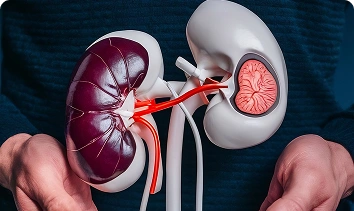Kidney Cancer


Understanding Kidney Cancer
Kidney cancer, also known as renal cell cancer or RCC occurs when abnormal cells in the kidney grow uncontrollably, forming a tumor. Early detection is crucial, as kidney cancer can spread to other parts of the body if untreated.
At Dr. Amit Goel – Best UroOncologist in Gurugram, we provide comprehensive care for kidney cancer, including early diagnosis, advanced treatment, and long-term follow-up to ensure the best possible outcomes.
Common Symptoms of Kidney Cancer
- Blood in urine (hematuria)
- Persistent pain in the side or back
- A lump or mass in the abdomen
- Unexplained weight loss
- Fatigue
- Fever that is not caused by infection
- Night sweats
It’s important to consult a UroOncologist if any of these symptoms are present, even intermittently.
Causes & Risk Factors
- Smoking: Increases risk significantly
- Obesity: Linked to higher kidney cancer incidence
- High blood pressure (hypertension)
- Family history: Genetic predisposition
- Chronic kidney disease or dialysis
Diagnosis
Accurate diagnosis is essential for effective treatment. Our diagnostic approach includes:
- Blood and Urine Tests: Assess kidney function and detect abnormalities
- Ultrasound & CT Scans: Identify tumors and evaluate size and location .
- CT Renal Angiography : for blood vessels supplying the tumour for partial nephrectomy (Nephron sparing surgery)
- MRI Scans: For detailed imaging of kidney tissue.
- Tc 99 DTPA Renal scan for Split Kidney Function.
Biopsy: In selected cases only to confirm the type of kidney cancer (Not routinely recommended)
Kidney Cancer Treatment
Treatment is personalized based on the stage, size, and location of the tumor, as well as the patient’s overall health.
Surgery
- Partial Nephrectomy: Removal of the tumor while preserving healthy kidney tissue.
- Radical Nephrectomy: Complete removal of the affected kidney in advanced cases.
Radical Nephrectomy with IVC Tumour Thrombectomy
- Radical Nephrectomy with IVC Tumour Thrombectomy for Tumours invading the Inferior venal cava and going upto the heart.
Robotic Surgery/Laparoscopic Surgery
- Robotic-assisted / Laparoscopic surgeries allow precise tumor removal with smaller incisions, Less blood loss and faster recovery and excellent Cancer cure rates.
Targeted Therapy & Immunotherapy
- Used in advanced or metastatic kidney cancer to slow tumor growth and improve survival
Radiation Therapy
- Rarely used for primary kidney cancer but may be applied for symptom management in certain cases
Follow-up & Monitoring
- Regular imaging and blood tests to detect recurrence early
- Lifestyle and diet guidance to support kidney health
Prevention & Long-term Care
While some risk factors like genetics cannot be changed, kidney cancer risk can be reduced by:
- Avoiding smoking and tobacco use
- Maintaining a healthy weight and active lifestyle
- Controlling high blood pressure
- Regular health check-ups and kidney screenings
